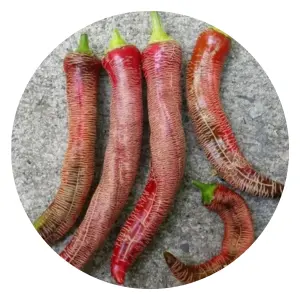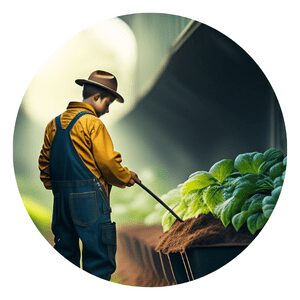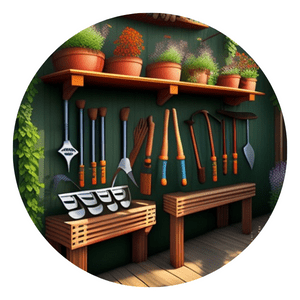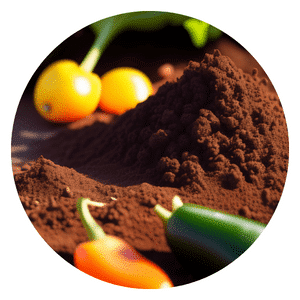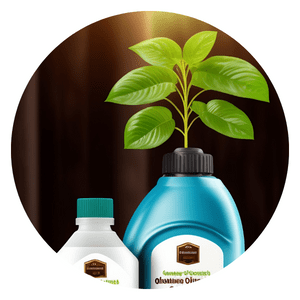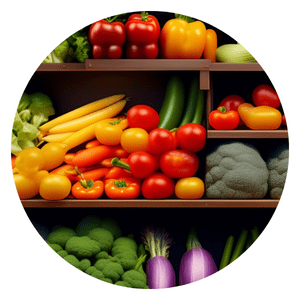How Often To Water pepper plant?
Pepper plants are a delightful addition to any garden or indoor space, adding vibrant colors and a fiery kick to our culinary endeavors.
However, successfully nurturing these piquant beauties requires some know-how, particularly when it comes to watering.
Finding the right balance can be challenging – too much water can drown the delicate roots while too little can cause stunted growth and withering leaves.
In this article, we will dive into the world of pepper plant care and answer the burning question: how often should you water your pepper plant?
Pepper Water Menu
Check the Soil Moisture
Checking the soil moisture is key to determining when to water your pepper plants.
Stick your finger about an inch into the soil, and if it feels dry, it’s time for some hydration.
But here’s the catch: peppers prefer consistently moist but not soaking wet soil.
While overwatering can lead to root rot and other issues, underwatering can cause stunted growth and reduced fruit production.
To strike the right balance, it’s essential to understand the specific water needs of your pepper plants.
Factors like temperature, humidity levels, and the type of soil you have will influence how often you need to water them.
During hot summer months, your peppers might require more frequent watering due to evaporation.
On the other hand, cooler weather or rainy periods may mean less watering is necessary as natural rainfall provides sufficient moisture.
Remember that different varieties of pepper plants might have slightly different moisture requirements as well.
Some varieties are naturally more drought-tolerant than others and can handle longer intervals between watering sessions.
It’s always a good idea to check with local gardening experts or consult online resources specific to your pepper plant variety for tailored advice on providing optimal care for these heat-loving beauties.
Morning Magic
Are you wondering what time of day is best to water your pepper plants? Look no further than the morning!
Watering your pepper plants in the early hours gives them a head start in absorbing the much-needed moisture before the scorching sun unleashes its heat. This magical morning routine ensures that your plants have ample time to hydrate their roots and leaves, setting them up for success throughout the day.
By watering in the morning, you allow water droplets to settle on the plant’s surface, creating a cool and refreshing environment.
As they absorb this moisture, peppers can better tolerate rising temperatures later in the day.
Furthermore, since foliage has time to dry off before nightfall, this practice reduces the risk of fungal diseases caused by prolonged leaf moisture. So not only will you be aiding your pepper plants’ growth and development but also preventing potential problems down the line.
Experts suggest that watering early in the day helps maintain optimal soil moisture levels for peppers while minimizing water loss due to evaporation. This timing allows water to penetrate deeply into the soil without being wasted through evaporation during midday heat.
Additionally, when combined with well-draining soil and mulch around plants’ base, morning watering ensures excess moisture is efficiently drained away from sensitive roots areas rather than stagnating there under hot rays of sun.
To sum it up
Ensure the water reaches the root zone for healthy growth.
Watering your pepper plants is a crucial aspect of their overall health and growth.
While it may be tempting to simply give them a light sprinkling every day, aiming for deep root saturation is the key to ensuring optimal growth and development.
When you water your pepper plants, it’s essential to ensure that the water reaches the root zone, where absorption occurs.
Deep root watering allows the roots to grow deeper into the soil, leading to stronger and more resilient plants. This method encourages the roots to search for water by penetrating deeper into the soil rather than staying close to the surface.
In turn, this helps your pepper plants withstand dry periods better as they have access to moisture deeper in the ground.
To achieve deep root saturation, thoroughly soak the soil around your pepper plants until you see water seeping out of the drainage holes at the bottom of their containers or garden beds.
Providing this deep watering less frequently is more beneficial than frequent shallow watering as it promotes healthy root development and prevents over-saturation of the topsoil.
By adopting this approach, you can help create an ideal environment for your pepper plants’ roots, enabling them to extract nutrients effectively from below and thrive in various weather conditions.
So remember: when it comes time to water your peppers, aim for that deep root saturation – because healthy roots mean healthy peppers!
In the garden, a pepper plant stands tall, Its leaves reaching for the sun's warm caress. But how often must we answer its call? To water or not to water, I confess. The soil, though moist, can dry with fleeting days, For peppers thirst, days hot and long. So every week, in different ways, We quench their thirst with love and song. But be cautious to not drown their roots, Watering in moderation is the key. Let them breathe and flourish with tender shoots, And through sweet peppers' bounty we shall see.
Chappy The Gardener
Deep and Thorough
When it comes to watering your pepper plants, it’s not just about how often you water, but also about how deeply you water.
Deep root saturation is key for healthy growth and a thriving plant.
Many gardeners make the mistake of only giving their plants a light sprinkle on the surface, which only leads to shallow root development and weaker plants.
To ensure that the water reaches the root zone, it’s important to water slowly and deeply. This allows the water to penetrate down into the soil and reach the roots where it is needed most.
One way to achieve this is by using drip irrigation or soaker hoses that deliver water directly to the base of the plants.
Another technique is known as deep watering, where you saturate a small area around each plant instead of lightly sprinkling over a larger area.
Deep root saturation not only promotes stronger plant growth but also helps increase drought tolerance and reduces the need for frequent watering.
By encouraging deeper rooting, you are helping your pepper plants become more resilient and better equipped to withstand dry periods without suffering from stress or wilting.
In conclusion, when it comes to watering your pepper plants, remember that deep and thorough watering is essential for their healthy growth.
Aim for deep root saturation by watering slowly and deeply, ensuring that the water reaches down into the root zone.
By doing so, you will be promoting stronger plant development and reducing their dependency on frequent watering.
So don’t just scratch at the surface – go deep!
Water at the Base
Watering is a critical aspect of plant care, and it’s no different when it comes to pepper plants.
However, the way you water your pepper plants can greatly impact their overall health and productivity.
One important tip is to direct the water at the base of the plant rather than overhead.
By doing so, you minimize foliage wetness which can lead to potential disease.
When foliage gets wet from overhead watering or rain, it creates a damp environment perfect for fungal growth.
Fungal diseases such as powdery mildew and leaf spot thrive in these conditions and can severely damage your pepper plants.
By watering at the base of the plant instead, you ensure that only the root zone receives moisture while keeping leaves dry.
Not only does direct watering minimize disease risk, but it also maximizes nutrient absorption by focusing water directly on the roots where they need it most.
Watering at the base helps prevent wastage as well since less water evaporates before reaching its intended target.
So next time you tend to your pepper plants, remember to aim your watering can or hose at their base for optimal results and healthy growth!
Mulch Matters
When it comes to growing healthy and vibrant pepper plants, mulching might just be the secret ingredient you’ve been missing.
By applying a layer of organic mulch around the base of your pepper plants, you can effectively retain soil moisture and regulate temperature. This simple addition to your gardening routine can make all the difference in ensuring your peppers thrive throughout the growing season.
One of the key benefits of using organic mulch is its ability to conserve water.
By acting as a protective barrier between the soil surface and external elements, such as wind and sunlight, mulch prevents rapid evaporation. This means less watering for you while keeping essential moisture locked in the soil where your pepper plants need it most.
In addition, by providing an insulating layer, organic mulch helps regulate soil temperature. This is especially important for pepper plants as they prefer warm conditions but can suffer from heat stress if exposed to scorching temperatures.
A layer of mulch acts like a natural thermostat, moderating extreme fluctuations in temperature and creating a more stable environment for optimal growth.
Furthermore, organic mulches enrich the soil over time as they break down gradually into nutrients that benefit plant health. They encourage beneficial microbial activity in the root zone while suppressing weed growth through their dense cover.
Keep an Eye on Weather
Hot and windy days can quickly evaporate the moisture in the soil, leading to drought stress in pepper plants. It is crucial to stay vigilant and adjust your watering frequency accordingly.
When the weather is scorching and windy, the water in the soil evaporates at a faster rate, leaving your plants dehydrated.
To prevent this, increase the frequency of watering during these periods to ensure that your pepper plants receive an adequate water supply.
However, it is important to strike a balance when increasing watering frequency on hot and windy days.
While more frequent watering may be necessary, overwatering can be just as damaging to pepper plants as under-watering.
Excess water can drown the roots and lead to root rot or other diseases.
So while you want to keep an eye on weather conditions and increase watering when necessary, it’s essential not to go overboard.
By adapting your watering schedule based on weather conditions, you are providing optimal care for your pepper plants and improving their overall health.
Keeping an eye on weather forecasts can give you an edge in gardening success by allowing you to anticipate any changes that might affect your plant’s water needs.
By adjusting your watering frequency accordingly, you can help ensure that your pepper plants thrive even on hot and windy days.
Establish a Routine
Establishing a routine is crucial when it comes to watering pepper plants. These delicate plants prefer consistent moisture levels rather than being subjected to sudden wet-dry cycles.
By creating a regular watering schedule, you can provide your peppers with the stable conditions they need for healthy growth.
One important aspect of establishing a routine is understanding the specific water requirements of pepper plants.
On average, peppers require approximately 1-1.5 inches of water per week.
However, this can vary depending on factors such as temperature, humidity, and soil type. It’s essential to monitor your plant’s moisture levels regularly and adjust your watering schedule accordingly.
In addition to frequency, the timing of watering also plays a significant role in maintaining stable moisture levels for your pepper plants.
Watering early in the morning allows the leaves and soil surface to dry out during the day, reducing the risk of fungal diseases caused by prolonged leaf wetness.
Avoid watering in the late evening as this can leave foliage damp overnight – an ideal condition for disease development.
By developing a consistent watering routine tailored specifically for your pepper plants’ needs, you’ll provide them with optimal growing conditions while minimizing stress and potential damage caused by sudden changes in moisture levels.
Use a Drip System
One of the most effective ways to ensure that your pepper plants receive the right amount of water without wasting it is by using a drip irrigation system.
Unlike traditional sprinklers, which can result in water wastage due to evaporation and runoff, drip irrigation delivers water directly to the root zone of the plants. This targeted approach not only reduces evaporation rates but also helps to prevent fungal issues on leaves, as the foliage remains relatively dry.
By delivering water at a slow and steady pace, drip irrigation allows the soil to absorb moisture more efficiently. This not only promotes healthier root growth but also minimizes stress on your pepper plants, making them less susceptible to disease and drought conditions.
Additionally, by reducing contact with moist foliage, you can prevent leaf diseases that thrive in damp environments.
Installing a drip system may require some initial investment and effort, but its long-term benefits make it well worth considering for any garden or small-scale farming operation.
With precise control over watering levels and minimized water loss due to evaporation or runoff, you can help conserve this valuable resource while ensuring that your pepper plants have optimized conditions for healthy growth.
Give your plants their best chance at success with a drip irrigation system – they’ll thank you with bountiful harvests!
Growing in Containers
Growing peppers in containers can be a rewarding experience, allowing you to enjoy fresh and flavorful peppers right from your backyard or balcony.
However, it’s important to understand that container-grown peppers have different watering needs compared to those grown in the ground.
One crucial factor to consider is the faster evaporation rate from the sides of the pot.
The smaller volume of soil and exposure to sunlight on all sides make containers prone to quicker drying out.
As a result, container-grown peppers may require more frequent watering compared to their counterparts planted directly in the ground.
Monitoring the moisture level of the soil regularly is essential to ensure that your plants are adequately hydrated. You can do this by sticking your finger about an inch deep into the soil; if it feels dry at this depth, it’s time for some water.
Frequent watering is especially crucial during hot summer months when evaporation rates are even higher.
Avoid letting your container-grown peppers go completely dry between waterings as this can stress out the plants and negatively impact fruit production.
Additionally, consider using mulch or adding organic matter like compost or coconut coir around your pepper plants; these materials help retain moisture in pots by reducing evaporation and protecting roots from extreme temperature fluctuations.
Leaf Check
One of the telltale signs that your pepper plant may be suffering from water stress is wilting leaves.
When a plant doesn’t receive enough water, it tries to conserve what little moisture it has left by closing its stomata, tiny pores on the leaves that regulate gas exchange. As a result, the leaves wilt and sag since they are unable to draw in as much water from the soil.
It’s crucial to monitor the condition of your pepper plant’s leaves regularly, especially during hot and dry periods, as wilting can quickly escalate into more serious damage.
However, it’s essential to strike a balance when it comes to watering your pepper plants. While insufficient water can cause wilting and drought stress, overwatering can have similar symptoms.
Overwatered plants also close their stomata in an effort to prevent excessive water loss. This restriction hampers nutrient uptake for photosynthesis and leads to drooping leaves that might resemble those caused by lack of hydration.
The key is not only monitoring for wilting but also ensuring you’re providing just the right amount of water for healthy growth.
Ultimately, monitoring your pepper plant closely for any signs of wilting or leaf distress is crucial in determining its watering needs adequately.
Remember that different factors like temperature, humidity levels, and pot size can all influence how frequently your plant needs watering.
By paying attention to these cues and adjusting accordingly, you’ll be well on your way to maintaining healthy pepper plants that thrive throughout the growing season.
. Ut elit tellus, luctus nec ullamcorper mattis, pulvinar dapibus leo.
In conclusion, determining how often to water a pepper plant can be a bit of trial and error.
It is important to consider factors such as the climate, soil moisture, and the specific needs of the pepper variety being grown.
Generally, peppers require consistent moisture to thrive but also need well-draining soil to avoid overwatering.
Observing the plant closely and monitoring the moisture level of the soil is crucial in finding the right watering schedule.
Remember, it is always better to underwater than overwater peppers as they are susceptible to root rot.
By following these guidelines and adjusting as needed, you will be able to provide your pepper plants with the optimal amount of water for healthy growth and abundant harvests.
Click To Grow
Helps Us Grow – Share If You Like

